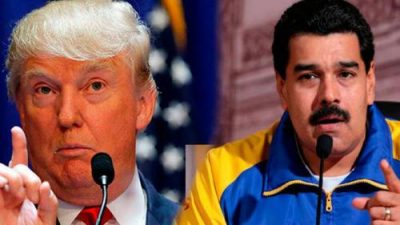Trump Slams Guaidó While Expressing Openness in Speaking with Maduro

In what potentially could be a radical change in Washington’s policy towards Venezuela, U.S. president Donald Trump confessed that he has had doubts about his decision to recognize opposition leader Juan Guaidó as president of the South American country. Trump revealed in an interview with Axios in the Oval Office what he thinks about the self-proclaimed wannabe president of Venezuela, Guaidó, and even confessed that he “would maybe think” of meeting personally with Venezuelan President Nicolás Maduro, who has already publicly expressed his willingness to talk with the American president.
“Maduro would like to meet. And I’m never opposed to meetings — you know, rarely opposed to meetings. I always say, you lose very little with meetings. But at this moment, I’ve turned them down,” Trump said.
In a preview of the interview published by Axios, Trump revealed how little confidence he has in Guaidó because the politician failed to take control of the Venezuelan government despite the strong support provided by the U.S. and another 60 countries that recognize him as the legitimate president.
Asked by Axios whether he regretted his decision on backing Guaidó on the advice of John Bolton, his former National Security Advisor, Trump initially said “not particularly,” but then went on to say, “I could have lived with it or without it, but I was very firmly against what’s going on in Venezuela.”
In another part of the interview, Trump speaks directly of the moment when he decided to recognize the opposition leader as president: “Guaidó was elected. I think that I wasn’t necessarily in favor, but I said — some people that liked it, some people didn’t. I was OK with it. I don’t think it was — you know, I don’t think it was very meaningful one way or the other.”
Also, in the preview, Axios quoted a fragment of Bolton’s upcoming book The Room Where It Happened, where he reveals some behind the scenes diplomacy of the Trump Administration and the private feelings the president has about Guaidó. Bolton says that Trump “thought Guaidó was ‘weak,’ as opposed to Maduro, who was ‘strong’” and that “Trump was calling Guaidó the ‘Beto O’Rourke of Venezuela,’ hardly the sort of compliment an ally of the United States should expect.” O’Rourke, who was a Democratic Presidential Candidate and is one of Trump’s biggest critics, was called a “poor bastard” who “quit like a dog” by the American president, a demonstration of just how low Trump thinks of Guaidó.
Trump in the interview described Bolton as a “nutjob” who may be the “dumbest human being on Earth.” Trump could perhaps seek to slowly normalize relations with Maduro and move away from Guaidó, while placing the blame entirely on Bolton for the escalation of hostilities between Washington and Caracas.
In 2019, shocking events were triggered when Guaidó proclaimed himself president. An attempt to forcibly enter a shipment of “solidarity aid” into Venezuela from Colombia that likely had weapons was made; Venezuela suddenly was without electricity after a cyberattack; there was another coup attempt; and, many attacks on military barracks. Yet, Maduro survived the intense pressures from the U.S. and sixty of its allies.
The American President is known to admire authoritarianism and/or strong leaders. Despite sanctions, coup attempts and threats of military invasion, Maduro has not only survived the U.S.-led destabilization, but cemented his positions as leader of Venezuela. Although they may be adversaries, it would not be a wild claim to say that Trump admires Maduro’s strength and determination, especially as Guaidó utterly failed when he had every advantage afforded to him.
If someone had said in 2019 that just a year later Venezuela would not only be more stable than the U.S. when we consider the Black Lives Matter uprising in the aftermath of the George Floyd murder, but would also achieve a seat in the UN Human Rights commission, no one would have believed it.
The U.S. could not allow 2019 to confirm the decline of its dominance over Latin America. With the defeat it suffered in Venezuela, the return of Cristina Kirchner in Argentina and the breakdown of neoliberal governments in the region, Washington had to resort to coups to protect its interests, as seen in Bolivia.
Venezuela now has a fragmented opposition to Maduro that is immersed in an internal war. At this point, Guaidó is not guaranteed to be re-elected as president of the National Assembly. For the U.S. however, it does not matter who occupies that position so long as they are serving Washington’s agenda. The so-called Deep State in the U.S. remains pitifully unchanged in their policy to destroy the existence of sovereign governments in the region. However, is Trump attempting to break free of such war hawks by expressing an openness to speak with Maduro? Although Trump may have individual opinions on not wanting to challenge Venezuela, despite public rhetoric, he will be restricted by the main power structures that exist in the U.S. and push for complete dominance no matter the administration in power and what they want to achieve.
*
Note to readers: please click the share buttons above or below. Forward this article to your email lists. Crosspost on your blog site, internet forums. etc.
This article was originally published on InfoBrics.
Paul Antonopoulos is an independent geopolitical analyst.

